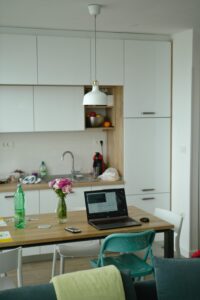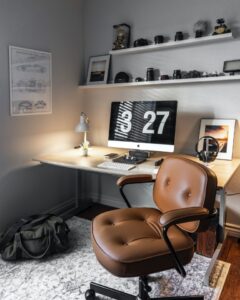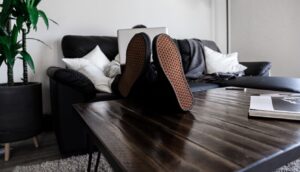
As the world adjusts to living with a global pandemic, those of us who can, are adapting to working at home. For many of us this is a novel approach to our professional lives which can certainly have its challenges!

Adjusting to a new way of working
Here are our tips on the ‘new normal’ of working in your kitchen or bedroom office and how to get the best out of the situation:
If you are lucky enough to have a full home office set-up then that’s great, but most of us haven’t planned for this new way of working, so we have to make do.
That said, it does make sense to try and establish a defined working area, ideally a desk where you can keep your work equipment and compartmentalise professional requirements from the rest of your life.

Most of us don’t have an office at home
Under current circumstances, you may need to alter your work hours to accommodate childcare or other commitments but do try to establish a regular routine and stick to it.
It is not necessary to dress in full business attire but getting dressed for the day will also help you switch your mind into work mode. Maintain a sensible ‘to do’ list as this will create structure and help you to keep on top of what needs to be done.

Stick to a defined working day
It is also important to draw a line under your working day at ‘close of business’. Put your ‘phone and laptop on one side and only answer messages or deal with requirements when necessary, to help prevent work from impinging on your at home life. It is really important to take the time to relax and take care of your mental health.
A recent article in the Mirror Online includes guidance from the Harley Street osteopath Andrew Doody.
He provides the following advice for healthy home working:
Sit on an office chair if you can, but if you don’t have one available then you can improve your posture by ensuring that your feet are flat on the floor and that your body is positioned as close as possible to 90 degrees.
Lying down or sitting on a couch will cause you to slump, so try to work a flat surface or table if you can.

Sit at a table if possible!
Laptops are useful for homeworking but their positioning can be tricky. It is difficult to adjust your screen to the right height when it can’t be separated from the keyboard. This may cause you to lean forwards and strain your neck and shoulder muscles, so ideally use a separate keyboard and have your screen at the correct eye level.
To avoid keyboard strain, wrists and arms should be level and straight.
Take time-out for mini exercise sessions. A benefit of being at home is that you can get up, stretch, and walk around more than you can in the office so take advantage of this. You might want to consider doing some of your work standing up as this is good for your posture, neck and shoulders.

Doing some work standing up is good for your posture
Don’t forget to take care of your eyes.
Most of us are used to working in bright office environments but a combination of lower light and using smaller screens can cause eye strain, which in turn can lead to headaches. Make sure that your work area is well lit with natural and artificial light.

Avoid eye strain with the correct levels of light
Working at home is generally more sedentary and this lack of movement as well as spending more time at home feeling bored can lead to idle snacking and the expansion of waistlines! It may be tempting to nibble but try and avoid this. Stick to normal eating times and try to keep your diet as healthy as possible.
You will generally feel better and taking a proper break at lunchtime will support your mental wellbeing as well.

A healthy diet is good for both mind and body
Try and get outside at least once a day either before or after work (providing you are not required to self isolate).
Fresh air, sunshine (when available) and exercise are good for both our mental and our physical health.

Try to get outside for a walk or a run
Many of us are becoming all too familiar with the trials and tribulations of video conferencing, but keeping in contact with people is good for us.
Find ways to engage with your colleagues and although not ideal, remote contact is better than no contact, so a call or vidcon is better than nothing.

Keep connected with colleagues
Remaining both productive and positive is easier said than done.
There are so many frustrations that working from home can cause; IT problems, lack of connectivity to clients, inability to concentrate when other members of your household (sometimes small ones) distract you and demand your attention.

Try not to let frustration get the better of you
It is important to try to be kind to yourself and accept that you may not be 120% productive under current circumstances.
Work in the most positive way that you can and prioritise taking care of your physical and mental health. This situation won’t last forever so do the best that you can.

We are all in this together!
Don’t forget, you can still register your CV with us and have a browse of our website and blog section for help and advice.
We know you are not probably actively recruiting at the moment but we will be delighted to have a discussion about your future requirements, so that can have the right candidates ready when you need them.
Please give us a call or email us today.